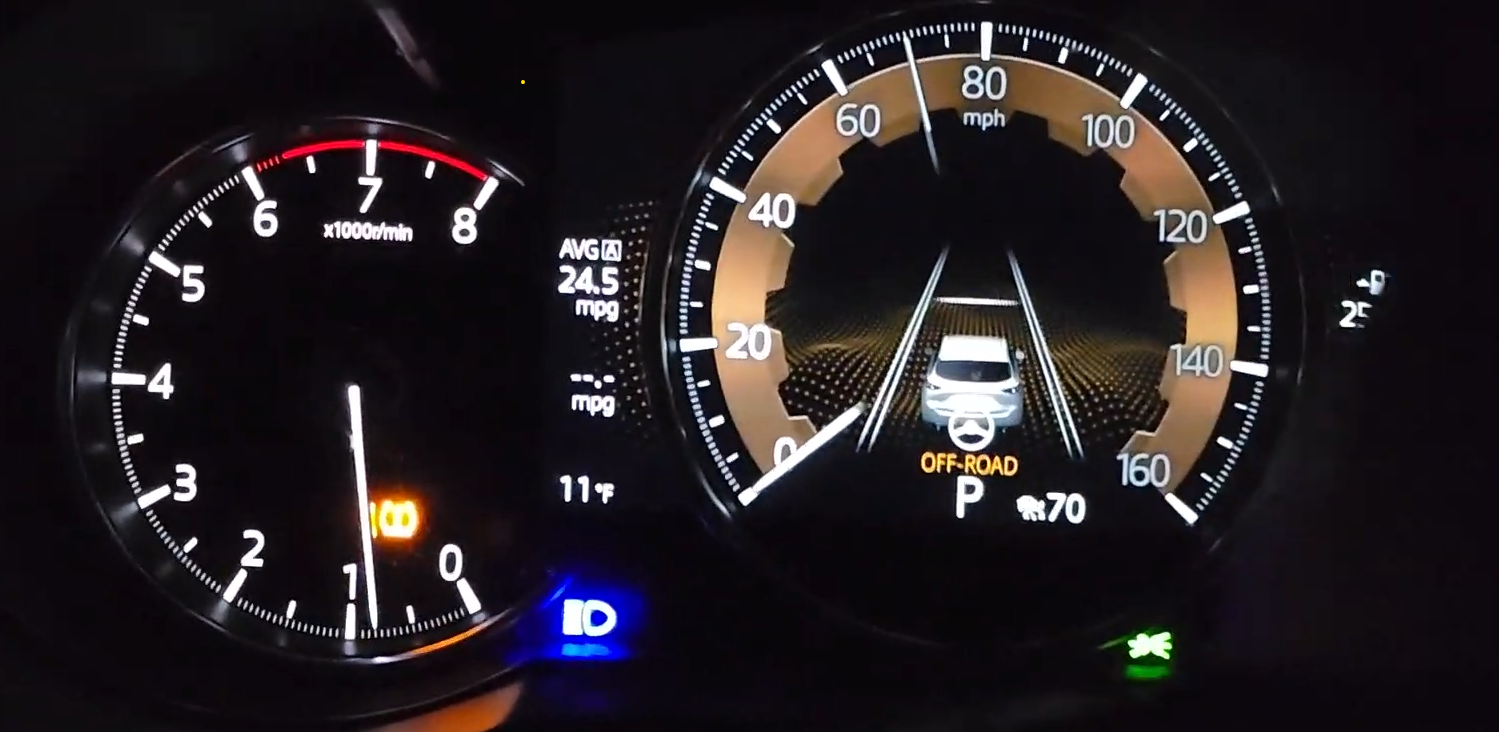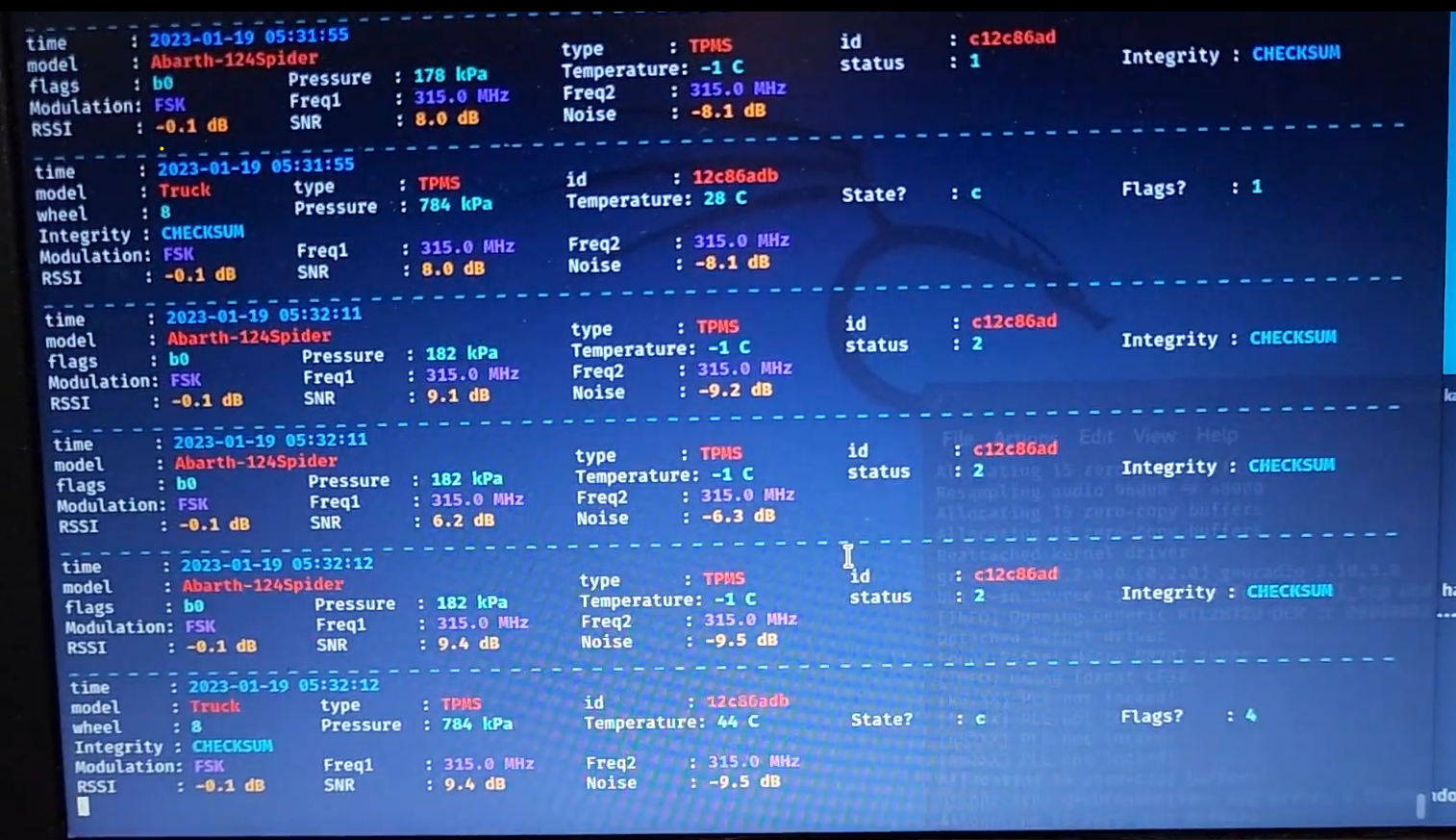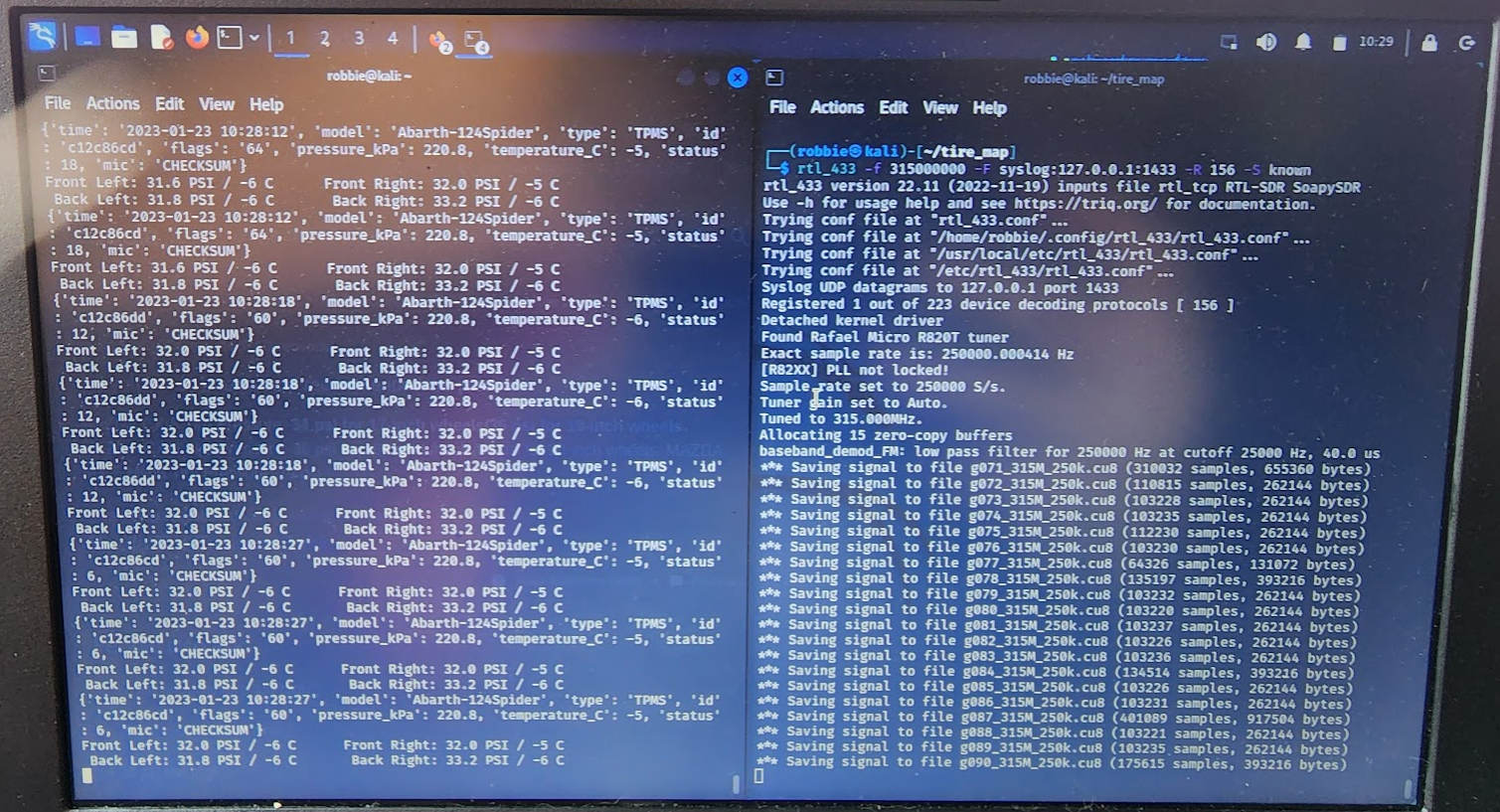My 2022 CX-5 had the low tire pressure light turn on the other day, and my first response was to start mashing the steering wheel info button to see which tire was low on pressure. Puzzled when I did not find a readout of the tire pressures on the dash, I checked the paper and digital manuals for more information. After reading these and investigating other sources, I found that while Mazda uses direct TPMS sensors that transmit pressure and temperature data with accompanying unique sensor ids to the car’s computer via RF signals, the car does not a have a system to interpret those readings individually. The year is the current year, and finding this wholly unacceptable, I set out to build myself a TPMS receiver that could interpret these readings for each tire separately immediately after I repaired the hole created by a nail and reinflated the tire with low pressure.

RTL-433 (rtl_433) is an open source software project written in C that uses RTL-SDR devices to demodulate common electronic pulse signals on ISM (Part 18) or Part 15 bands to include 315 MHz, 433 MHZ, 915 MHz, and others. The software has the capability to do provide minimized pulse data descriptors and to provide baseband snippets of captured pulses for further analysis. If I was going to have to write a decoder, it should be an extension to this already huge project that sports ~200 common pulse signal decoders. Should that task be necessary, the analysis tools provided by rtl_433 would prove very helpful.
My first step in the process to build the TPMS readout was to just run the rtl_433 command with my car off and in my garage to see if I would pick up any signals from the car’s tire sensors, but I received no signals in doing this. I had found another article on this subject of reverse engineering Mazda TPMS sensors which all but confirmed that in the US these would be 315 MHz signals in 70kHz BW FSK using standard manchester encoding, so I wanted to look at the baseband data being received by my RTL-SDRv3 to see if I was observing anything matching that description. When I ran gqrx or sdrpp and observed the waterfall, all I saw was ~200kHz BW BFSK signals from my car’s fob interogator system and the responses from the fob in my pocket.
After doing some more reading online, I learned that TPMS sensors in car tires are powered by small batteries that have to last for several years. To save power, they only transmit when large changes in tire pressure are observed or when the tires are spinning (i.e. when the sensor is accelerating). I repeated my initial experiment with rtl_433 again, this time collecting signals while I was driving the car, and I observed several similar TPMS protocol decoders reporting back data.

Now that I had data from rtl_433, I looked for the decoder output that most accurately reported info about my tires. It seemed the one giving me readings of roughly 210-220 kPa and temps around 0C (it’s cold here in DM79 right now) was the most reasonable; this was the Abarth-124Spider decoder (-R 156) already built for rtl_433. Looking at other output fields it was clear that there were 4 different sensor id numbers in the data: 0xc12c86ad, 0xc12c86cd, 0xc12a5716, and 0xc12c86dd. At this point, I appended some functions to the bottom of an MQTT monitor relay for rtl_433 example python script that would display the data from each of these individually and made arbitrary assumptions about which tires were which.
# initial guesses
FL = {'id':'c12c86ad','psi':0,'temp':0} test FL at ~35 psi set by hand
FR = {'id':'c12c86cd','psi':0,'temp':0} test FR at ~30 psi set by hand
BL = {'id':'c12a5716','psi':0,'temp':0} test BL at ~20 psi set by hand
BR = {'id':'c12c86dd','psi':0,'temp':0} test BR at ~25 psi set by hand
After making initial guesses, and verifying my software was working, I had to properly map the tires to my vehicle. To do this I filled each of them to a different pressure, roughly 20, 25, 30, and 35 psi. I then drove in a circle till I had data at each of these pressures reported and remapped the tires to the correct positions in my software.
# final tire mapping
BR = {'id':'c12c86ad','psi':0,'temp':0} # tpms measured 24.4 in test -> BR
FR = {'id':'c12c86cd','psi':0,'temp':0} # tpms measured 27.2 in test -> FR
BL = {'id':'c12a5716','psi':0,'temp':0} # tpms measured 17.8 in test -> BL
FL = {'id':'c12c86dd','psi':0,'temp':0} # tpms measured 30.8 in test -> FL
I confirmed my mapping was correct by inflating/deflating the tires one at a time to 32 psi (32 instead of recommended 34 because it was ~0C outside) while receiving signals with my RTL-SDRv3 and this python script and watching the reports come in with one id only from the expected tire positions in sequential order as they were all restored to operating pressure. The result was a laptop-based TPMS readout for my car.

After getting everything working, I updated my python script to kick off the background rtl_433 process directly and now it runs in a single terminal window. I estimate that starting with my code below and updating the tire mapping ids for your Mazda, this capability could be replicated in just a few minutes of calibration/setup time.
Source Code
#!/usr/bin/env python
"""MQTT monitoring relay for rtl_433 communication."""
# This program listens on a UDP socket for syslog messages with a json
# payload, and publishes the data via MQTT. The broker connection is
# kept open (and automatically reconnects on failure). Each device
# is mapped to its own topic,
# Dependencies:
# Paho-MQTT; see https://pypi.python.org/pypi/paho-mqtt
# Optionally: PEP 3143 - Standard daemon process library
# (on 2.7, pip install python-daemon)
# To enable daemon support, uncomment the following line and adjust
# run(). Note that print() is still used.
# import daemon
from __future__ import print_function
from __future__ import with_statement
import socket
import json
import paho.mqtt.client as mqtt
import sys
import subprocess
# Syslog socket configuration
UDP_IP = "127.0.0.1"
UDP_PORT = 1433
# MQTT broker configuration
MQTT_HOST = "127.0.0.1"
MQTT_PORT = 1883
MQTT_USERNAME = None
MQTT_PASSWORD = None
MQTT_TLS = False
MQTT_PREFIX = "sensor/rtl_433"
def mqtt_connect(client, userdata, flags, rc):
"""Handle MQTT connection callback."""
print("MQTT connected: " + mqtt.connack_string(rc))
def mqtt_disconnect(client, userdata, rc):
"""Handle MQTT disconnection callback."""
print("MQTT disconnected: " + mqtt.connack_string(rc))
# Create listener for incoming json string packets.
sock = socket.socket(socket.AF_INET, socket.SOCK_DGRAM, socket.IPPROTO_UDP)
sock.bind((UDP_IP, UDP_PORT))
# Map characters that will cause problems or be confusing in mqtt
# topics.
def sanitize(text):
"""Sanitize a name for Graphite/MQTT use."""
return (text
.replace(" ", "_")
.replace("/", "_")
.replace(".", "_")
.replace("&", ""))
def parse_syslog(line):
"""Try to extract the payload from a syslog line."""
line = line.decode("ascii") # also UTF-8 if BOM
if line.startswith("<"):
# Fields should be "<PRI>VER", timestamp, hostname, command, pid, mid, sdata, payload.
# The payload might have spaces, so force split to stop after the sixth space.
fields = line.split(None, 7)
line = fields[-1]
else:
# Hope that the line was just json without the syslog header.
pass
return line
def rtl_433_probe():
"""Run a rtl_433 UDP listener."""
## Connect to MQTT
mqttc = mqtt.Client()
mqttc.on_connect = mqtt_connect
mqttc.on_disconnect = mqtt_disconnect
if MQTT_USERNAME != None:
mqttc.username_pw_set(MQTT_USERNAME, password=MQTT_PASSWORD)
if MQTT_TLS:
mqttc.tls_set()
mqttc.connect_async(MQTT_HOST, MQTT_PORT, 60)
mqttc.loop_start()
## Receive UDP datagrams, extract json, and publish.
while True:
line, addr = sock.recvfrom(1024)
try:
line = parse_syslog(line)
data = json.loads(line)
if data['model'] == 'Abarth-124Spider':
process_tires(data)
except ValueError:
pass
# initial guesses
#FL = {'id':'c12c86ad','psi':0,'temp':0} test FL at ~35 psi set by hand
#FR = {'id':'c12c86cd','psi':0,'temp':0} test FR at ~30 psi set by hand
#BL = {'id':'c12a5716','psi':0,'temp':0} test BL at ~20 psi set by hand
#BR = {'id':'c12c86dd','psi':0,'temp':0} test BR at ~25 psi set by hand
# final tire mapping
BR = {'id':'c12c86ad','psi':0,'temp':0} # tpms measured 24.4 in test -> BR
FR = {'id':'c12c86cd','psi':0,'temp':0} # tpms measured 27.2 in test -> FR
BL = {'id':'c12a5716','psi':0,'temp':0} # tpms measured 17.8 in test -> BL
FL = {'id':'c12c86dd','psi':0,'temp':0} # tpms measured 30.8 in test -> FL
def process_tires(data):
global FL, FR, BL, BR
print(data)
if (data['id'] == FL['id']):
FL['psi'] = data['pressure_kPa']*.1450
FL['temp'] = data['temperature_C']
elif (data['id'] == FR['id']):
FR['psi'] = data['pressure_kPa']*.1450
FR['temp'] = data['temperature_C']
elif (data['id'] == BL['id']):
BL['psi'] = data['pressure_kPa']*.1450
BL['temp'] = data['temperature_C']
elif (data['id'] == BR['id']):
BR['psi'] = data['pressure_kPa']*.1450
BR['temp'] = data['temperature_C']
print("Front Left:", "{:2.1f}".format(FL['psi']), "PSI /", FL['temp'], "C", "\t","Front Right:", "{:2.1f}".format(FR['psi']), "PSI /", FR['temp'], "C")
print(" Back Left:", "{:2.1f}".format(BL['psi']), "PSI /", BL['temp'], "C", "\t", " Back Right:", "{:2.1f}".format(BR['psi']), "PSI /", BR['temp'], "C")
if __name__ == "__main__":
if len(sys.argv) > 1:
print(sys.argv[1])
subprocess.Popen(['rtl_433 -R 156 -r '+ sys.argv[1] +' -F syslog:127.0.0.1:1433'],shell=True,stdout=subprocess.DEVNULL)
else:
subprocess.Popen(['rtl_433 -f 315000000 -R 156 -F syslog:127.0.0.1:1433'],shell=True,stdout=subprocess.DEVNULL)
rtl_433_probe()